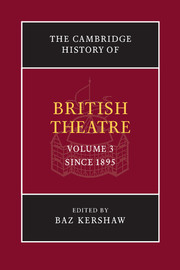Book contents
- Frontmatter
- Part I 1895–1946
- 1 British theatre, 1895–1946: art, entertainment, audiences – an introduction
- 2 The London stage, 1895–1918
- 3 Provincial stages, 1900–1934: touring and early repertory theatre
- 4 Popular theatre, 1895–1940
- 5 Case study: Cicely Hamilton’s Diana of Dobson’s, 1908
- 6 A critical year in perspective: 1926
- 7 The London stage, 1918–1945
- 8 Social commitment and aesthetic experiment, 1895–1946
- Part II Scottish and Welsh Theatres, 1895–2002
- Part III 1940–2002
- Bibliography
- Index
- References
2 - The London stage, 1895–1918
from Part I - 1895–1946
Published online by Cambridge University Press: 28 March 2008
- Frontmatter
- Part I 1895–1946
- 1 British theatre, 1895–1946: art, entertainment, audiences – an introduction
- 2 The London stage, 1895–1918
- 3 Provincial stages, 1900–1934: touring and early repertory theatre
- 4 Popular theatre, 1895–1940
- 5 Case study: Cicely Hamilton’s Diana of Dobson’s, 1908
- 6 A critical year in perspective: 1926
- 7 The London stage, 1918–1945
- 8 Social commitment and aesthetic experiment, 1895–1946
- Part II Scottish and Welsh Theatres, 1895–2002
- Part III 1940–2002
- Bibliography
- Index
- References
Summary
By the 1920s, after three decades of playwriting, Bernard Shaw (1856–1950) had finally attained the status of a major modernist writer. Heartbreak House, written during World War One, had opened in London in 1920. St Joan followed in 1923, and Shaw received a Nobel prize for literature in 1926. Since the 1890s Shaw had been creating a new kind of drama that blended the narrative genres of comedy, fable, history and romance with the rhetorical modes of disquisition, debate and declamation. London audiences, though at first slow to respond, had come to appreciate his unique wit and style, if not always his ideas. Shaw had become a celebrity, famous not only for the series of plays but also for his steady flow of wry pronouncements and grand pontifications. Peppering the English-speaking world with his thoughts on almost any conceivable topic of the day, from theatre reform to spelling reform, he challenged received opinions and traditions. And by means of his political activities in the Fabian Society, he helped to create the new Labour Party. Thus, through his plays and polemics, Shaw – the Irish outsider – had situated himself at the centre of London culture and society.
- Type
- Chapter
- Information
- The Cambridge History of British Theatre , pp. 34 - 59Publisher: Cambridge University PressPrint publication year: 2004
References
- 3
- Cited by



